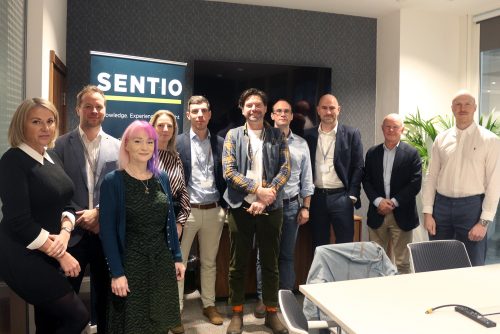Finding solutions to tech talent challenges

Yorkshire’s booming tech sector needs skilled talent to fuel its continued growth.
The last in our Talking Tech series of round tables, sponsored by Sentio, Armstrong Watson, Catax and Gordons, examined both recruitment challenges faced by tech companies and the use of tech to solve recruitment issues.
Like many sectors, the biggest challenge in the tech sector is not finding talent, it’s finding the right talent for any given team.
Philip White, managing director of software company Audacia, said, “An element of having ownership and collaboration is key on software projects. People assume technology is very black and white. It’s not, it’s very grey, so there are a lot of conversations and understanding. Cultural fit is probably our biggest challenge.”
Matthew Schofield of capital and R&D tax specialists Catax, said recruitment was a major factor in helping clients grow. “One of the biggest problems I see is retention, where there’s benchmarking done. People come in and say, quite rightly, Competitor X is paying 20% more, match it.
“Recruitment is about finding the right people, or the right culture, but then maintaining that, making sure the culture is embedded, but also that new recruits are given the opportunity to grow and learn and put their mark on the company and influence the culture upwards.”
Will Arnold, partner at finance and management firm Sentio, agreed. “We’re realising that as the team grows, you actually need to carve out a bit of your time to make sure everyone’s OK, particularly over the last two years.”
Matt Gaskell, associate director at international tech recruitment specialist iSource Group, also noted challenges in working culture, further complicated by cultural differences in regions across Europe. But as a recruitment firm, he found the biggest challenge was filling vacancies quickly.
“Speed to the right candidate is key,” he said. “We’ve invested a little bit recently in tech to help with that. The IT market is fiercely competitive. For us, it’s about providing a service to our clients, and speed to market makes a big difference.”
Delays in recruitment carry productivity costs, but Cognizant director Sarah Tulip said technology to speed processes would only work if it were aligned to human needs such as training and development goals. “You have to have humans that understand what you’re doing, why we’re doing it.
“Recruitment has to be quick. You have to capture that moment and excitement and all these things. People have to be scented to any technology that comes in, and any change in your process. Otherwise there’s no point putting that technology in, it won’t work.”
Crispin Read, founder and CEO of Coders Guild, said one of the biggest delays in recruitment was tortuous procedures at the start of the process intended to aid filtering. “What’s wrong is that the first step of the process is busted. They’ve made it really long.
“The thing we’ve adopted recently is that in the first part of our process you answer three questions that have work-based, role-based scenarios. We’re not asking for CVs, we’re not asking for experience. We just said, ‘What would you do in this situation,’ and we can filter those really quickly and react to them straight away. That was a real benefit to us.”
Sarah Tulip said Cognizant had a similar method, and filtered candidates simply by how they answered questions designed to demonstrate desired behaviour.
Angela Brown, founder of digital agency Meteoric Marketing, said she had tried automated filtering systems for recruitment, but had largely abandoned them for a human recruitment specialist. I realised half the people have an automated reply thing going for keywords, or they’re just clicking things that look vaguely familiar. If you have the patience, you’d have to try to find a slight relevance to the job role.”
The tech industry, like any office-based sector, has gone through profound changes in working style as a result of the pandemic lockdown. A straw poll of attendees showed overwhelming support for office-based or hybrid working rather than remote working.
Part of the reason for that was engagement, but development of junior staff also played a major part.
Ryan Gracy, partner at law firm Gordons, said, “My strong preference is to be in the office, where I can share information with other partners, but we need to bring up our junior staff – otherwise they’re just sat in a room reading some abstract article, or a bit of research they don’t really get. You need to contextualise that for them.”
Angela Brown agreed. “At that stage in your career, I’ve noticed a lot of it is osmosis – listening to what’s going on, how you deal with problems, the creative process. You haven’t got that if you’re sat at home, if you’re in a one-bedroom flat, staring at a screen and going stir crazy. The human side is really important.”
The preference for at least some office time seems to be reflected across the wider sector. The recruitment competition from London firms that tech firms experienced in early autumn had largely vanished, Philip White said. “I think both companies want people back in the office, and people have doubts about the fully remote setup,” he added.
Despite her own preference for office-based working, Tracy Iley, account manager with Flat Fee Recruitment, noted that work from home was the most-searched filter on their job boards over the past 18 months.
The important thing, attendees agreed, was to be flexible and to examiner which processes to make work-life balance easier for talent.
This was the final part of the Talking Tech round table series, sponsored by Sentio, Armstrong Watson, Catax and Gordons.









